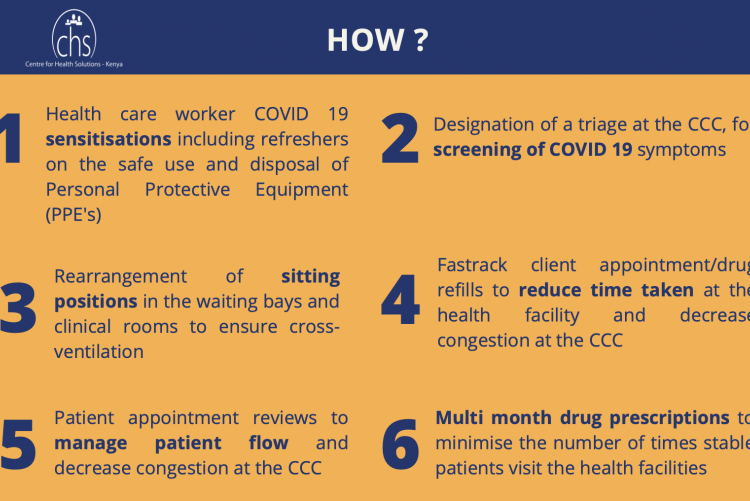As the fight against COVID 19 intensifies, Kenya continues to take significant strides and employ various measures to prevent and contain COVID 19. Although there has been no evidence indicating a higher risk of infection among PLWHIV/TB precautions must be taken to safeguard the lives of millions of PLWHIV accessing health services, and the health care workers providing these services as well as employ measures to ensure continuity in the safe delivery of HIV/TB prevention, treatment and care services.
PLWHIV are required to take lifesaving antiretroviral medication every day. Their health and adherence to medication are closely monitored through monthly appointments where patients visit the health facility’s Comprehensive Care Clinic (CCC) for review and refill of drugs. Exceptions are made for stable patients (patients who are virally suppressed) who are given multi-month prescriptions with appointments scheduled after 3-6months.
Adapting HIV health services delivery to prevent COVID transmission and Infection is essential in ensuring clients can still access HIV services.
CHS is committed to ensuring access to high-quality health services at all times and understands the importance of ensuring continuous access to essential HIV services.
As the government continues to work towards containing COVID 19, we support these efforts by adapting evidence-based precautions to protect patients seeking health services as well as health care workers providing services while ensuring the continued provision of health services.
With support from the United States President’s Emergency Plan for AIDS Relief (PEPFAR) through Centers for Disease Control and Prevention (CDC) CHS is currently supporting the implementation of HIV prevention, treatment and care services across 425 supported health facilities in seven counties through its Shinda, Tegemeza Plus and Naishi projects.
- Log in to post comments

